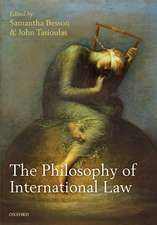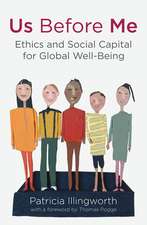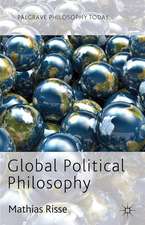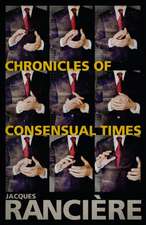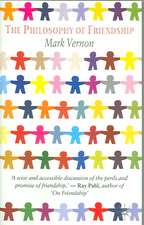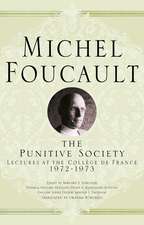Care, Uncertainty and Intergenerational Ethics
Autor C. Grovesen Limba Engleză Hardback – 28 noi 2014
| Toate formatele și edițiile | Preț | Express |
|---|---|---|
| Paperback (1) | 500.59 lei 6-8 săpt. | |
| Palgrave Macmillan UK – 2014 | 500.59 lei 6-8 săpt. | |
| Hardback (1) | 640.59 lei 6-8 săpt. | |
| Palgrave Macmillan UK – 28 noi 2014 | 640.59 lei 6-8 săpt. |
Preț: 640.59 lei
Preț vechi: 753.64 lei
-15% Nou
Puncte Express: 961
Preț estimativ în valută:
122.62€ • 133.23$ • 103.06£
122.62€ • 133.23$ • 103.06£
Carte tipărită la comandă
Livrare economică 21 aprilie-05 mai
Preluare comenzi: 021 569.72.76
Specificații
ISBN-13: 9780230358843
ISBN-10: 0230358845
Pagini: 251
Ilustrații: X, 251 p.
Dimensiuni: 140 x 216 x 23 mm
Greutate: 4.34 kg
Ediția:2014
Editura: Palgrave Macmillan UK
Colecția Palgrave Macmillan
Locul publicării:London, United Kingdom
ISBN-10: 0230358845
Pagini: 251
Ilustrații: X, 251 p.
Dimensiuni: 140 x 216 x 23 mm
Greutate: 4.34 kg
Ediția:2014
Editura: Palgrave Macmillan UK
Colecția Palgrave Macmillan
Locul publicării:London, United Kingdom
Cuprins
Preface Acknowledgements PART I 1. Introduction: Responsibility and Reflexive Uncertainty 2. The Limits of Intergenerational Justice 3. The Limits of Precaution 4. Administrative Imaginaries and Intergenerational Ethics PART II 5. Care and Uncertain Futures 6. Normative Implications of Care 7. Towards a Political Morality of Uncertainty 8. Horizons of Care
Recenzii
Christopher Groves' Care, Uncertainty and Intergenerational Ethics is that rarest of academic books, one that challenges existing dominant thinking from within, and offers a fresh and refreshing alternative based on the creative integration of seemingly disparate bodies of knowledge from outside the dominant paradigm and moral imaginary.
It challenges the dominant philosophical (and political) framing of obligations and rights between current and future people/generations as how to manage or think about inevitable distributional conflicts over goods and services we in the present pass on, or not, to future people. This dominant framing is also often informed by a liberal, individualist moral idiom, or as Groves puts it a 'managerial-cum-administrative' rationality, that is historically specific to contemporary technological societies. Groves, marshalling an impressive range of normative voices (from Hans Jonas, Hannah Ardent, Ulrich Beck, Alasdair MacIntyre to Brian Wynne), and disciplinary perspectives (phenomenology, science technological studies, moral psychology to post-normal science) challenges this liberal-distributive moral and social imaginary and presents an immanent critique and alternative. This alternative focuses on the ineliminable uncertainty that is constitutive of the human condition, the production of meaning through relations of care responding to vulnerability and dependency. These key ideas of uncertainty, care, vulnerability and dependency donot figure highly in liberal individualist thinking, and yet as eloquently expressed in Care, Uncertainty and Intergenerational Ethics, rethinking and imagining our ethical obligations to those yet to be born is precisely what we need to do as our technological prowess as a society increases and our knowledge and control about its impacts in and on the future declines.
The future is already here from the care perspective outlined in this fascinating book, in terms of the qualities of what and how we care and to which we are attached, and what values and narratives (not just resources) we choose to pass onto the future that we help make. Groves' non-religious reminder that, properly understood, a flourishing human life does not end with death but is intimately connected to care relations, practices and future projects offers a new foundation for rethinking our ethical obligations to the future. Care, Uncertainty and Intergenerational Ethics is an important book that sets a new research agenda namely that it is time we shift our moral frame and seek to 'cope with' rather than authoritatively and technologically 'solve' the 'problem' of the ineliminable uncertainty of the human condition. And perhaps above all else, to care for rather than engineer and manage the future.
John Barry, Professor of Green Political Economy, Queens University Belfast, author of The Politics of Actually Existing Unsustainability: Human Flourishing in a Climate Changed, Carbon-Constrained World (Oxford University Press).
It challenges the dominant philosophical (and political) framing of obligations and rights between current and future people/generations as how to manage or think about inevitable distributional conflicts over goods and services we in the present pass on, or not, to future people. This dominant framing is also often informed by a liberal, individualist moral idiom, or as Groves puts it a 'managerial-cum-administrative' rationality, that is historically specific to contemporary technological societies. Groves, marshalling an impressive range of normative voices (from Hans Jonas, Hannah Ardent, Ulrich Beck, Alasdair MacIntyre to Brian Wynne), and disciplinary perspectives (phenomenology, science technological studies, moral psychology to post-normal science) challenges this liberal-distributive moral and social imaginary and presents an immanent critique and alternative. This alternative focuses on the ineliminable uncertainty that is constitutive of the human condition, the production of meaning through relations of care responding to vulnerability and dependency. These key ideas of uncertainty, care, vulnerability and dependency donot figure highly in liberal individualist thinking, and yet as eloquently expressed in Care, Uncertainty and Intergenerational Ethics, rethinking and imagining our ethical obligations to those yet to be born is precisely what we need to do as our technological prowess as a society increases and our knowledge and control about its impacts in and on the future declines.
The future is already here from the care perspective outlined in this fascinating book, in terms of the qualities of what and how we care and to which we are attached, and what values and narratives (not just resources) we choose to pass onto the future that we help make. Groves' non-religious reminder that, properly understood, a flourishing human life does not end with death but is intimately connected to care relations, practices and future projects offers a new foundation for rethinking our ethical obligations to the future. Care, Uncertainty and Intergenerational Ethics is an important book that sets a new research agenda namely that it is time we shift our moral frame and seek to 'cope with' rather than authoritatively and technologically 'solve' the 'problem' of the ineliminable uncertainty of the human condition. And perhaps above all else, to care for rather than engineer and manage the future.
John Barry, Professor of Green Political Economy, Queens University Belfast, author of The Politics of Actually Existing Unsustainability: Human Flourishing in a Climate Changed, Carbon-Constrained World (Oxford University Press).
Notă biografică
Christopher Groves' work focuses on how people and institutions negotiate and deal with an intrinsically uncertain future. He has published widely on intergenerational ethics, the regulation of emerging technologies, and the sociology and politics of risk and uncertainty. He is co-author with Barbara Adam of Future Matters: Action, Knowledge, Ethics (2007).

